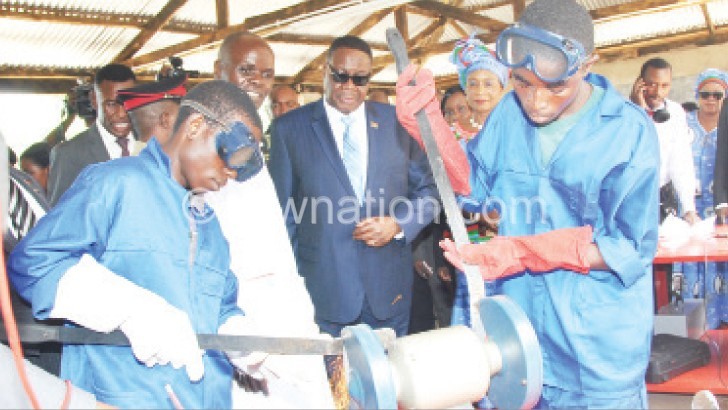Making technical education disability friendly
For a student with physical challenges, the difficult question is choosing between learning in a class of disabled students or an inclusive one.
While an inclusive class is preferable, the puzzle is on the ability to cope in a class facilitated by instructors without special needs education teaching skills.
Malawi, like many other countries, nodded to inclusive education over a decade ago. This followed revelations by the National Statistical Office (NSO) that by 2008, Malawi had over 530 000 people with various physical challenges. Of these, 336 000 were children below 18 years of age.

The estimates say the most common type of disability is hearing impairment (23 percent), followed by visual impairment (16.9 percent), reduced mobility (15.8 percent) and speaking difficulties (9.3 percent). Nonetheless, most disabilities were classified as ‘other’ (35 percent). These figures are likely to be up as the national population has increased by over three million according to NSO 2018 projections.
Government says during the 2012-2013 academic calendar, there were over 90 000 learners with various special needs in the country’s schools. This makes the inclusive education initiative a must for Malawi.
However, while there is observable progress in promoting inclusive education in primary and secondary schools, there is little to write about in tertiary education, especially in skills development careers offered in technical colleges. The colleges still register low intakes and experts attribute this to lack of resources to support the students with disabilities.
For instance, since 2015, only 108 trainees with physical challenges have been recruited in both public and private technical colleges. In 2016, the then Ministry of Labour, Youth, Sports and Manpower Development spokesperson Symon Mbvundula said of the 958 students in 10 community colleges, only five had various disabilities.
Earlier, Technical, Entrepreneurial and Vocational Education and Training Authority (Teveta) public relations specialist Lewis Msasa admitted the high inequality, saying the authority wants the learners with disability to account for 30 in every 100 enrolled-a quota seldom met by female trainees.
“It is a problem we have tried to solve, but we are still struggling to increase enrolment of trainees with physical challenges,” he said.
Being in minority, surviving in such setup remains a challenge, particularly that majority of their instructors have no teaching skills for students with special needs, in addition to lack of teaching materials.
Montfort Special Needs Education College acting principal Lucy Magagula says there are serious concerns that recruited trainees are not fully equipped to support inclusive classes.
“Access has been a challenge, the curriculum is not friendly and most instructors are not trained to support students with special needs. This is leading to high dropouts,” she says.
Soche Technical College instructor Benjamin Nkhata says lack of capacity on inclusive education has forced them to use improvised methods, but have been ineffective.
“Improvised methods we have been using have only worsened the quality of education for students with special needs,” he says.
Recently, government adopted and passed the disability Bill of 2012, which clearly stipulates the need for government to offer necessary support to all learners with special needs.
Section 10 of the Bill partly reads: “Government shall recognise the rights of persons with disabilities to education on the basis of equal opportunity and ensure an inclusive education system and lifelong learning.
“By ensuring that persons with disabilities are not excluded from the general education system at all levels. Have access to quality primary education taking into consideration the special requirements of persons with disabilities in the formulation of educational policies and programmes.”
Teveta says it recognises the gap in technical colleges to meet these law provisions and says they are trying to address them. Meanwhile, the institution has intensified training of instructors in technical colleges to support students with special needs.
Teveta has launched an orientation project that will train instructors in technical colleges to ensure the classes are disability friendly. The trainings will also produce specialised special needs education instructors for each college to support other instructors.
“We are happy that now that the door has been opened to make sure the instructors are fully trained,” says Magagula.
Speaking during the inaugural training at Nantipwiri Pastoral Centre in Thyolo, Teveta acting executive director Wilson Makulumiza-Nkhoma says the training will make technical colleges more inclusive.
“This initial training offered general orientation required for every instructor Tevet centres,” he says.
The pilot training groomed 31 instructors drawn from both private and public technical colleges. Nkhoma says the initiative needs to be complemented by upgrading infrastructure in the training centres to be disability friendly.
“Some institutions are disability friendly and some are not. We also regulate these institutions, and so, future licence renewals will be done for institutions that have improved their infrastructures to be disability friendly,” he says.
The step taken by Teveta is necessary as it nods to the global ambition spelled in the Sustainable Development Goals (SDGs) that “no one should be left behind”. However, Malawians, especially those with physical challenges have to wait until all technical colleges are disability friendly and intakes in such facilities create enough room to accommodate the deserving. n





